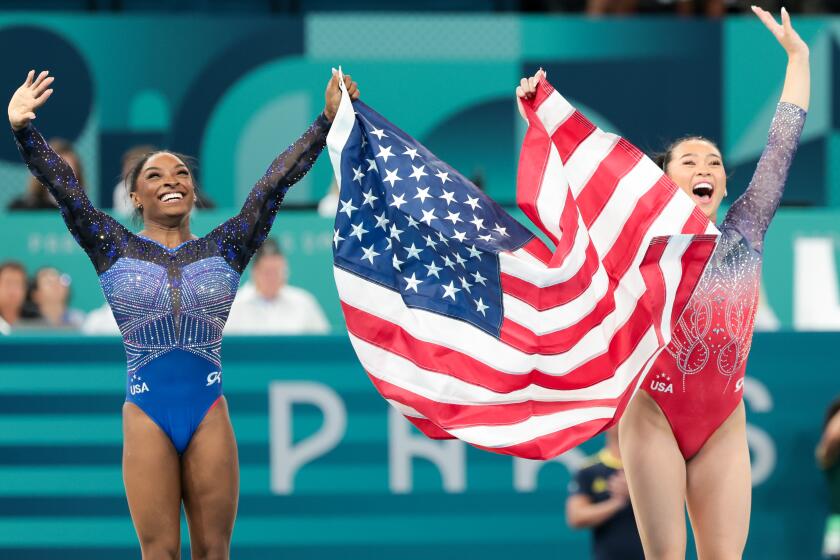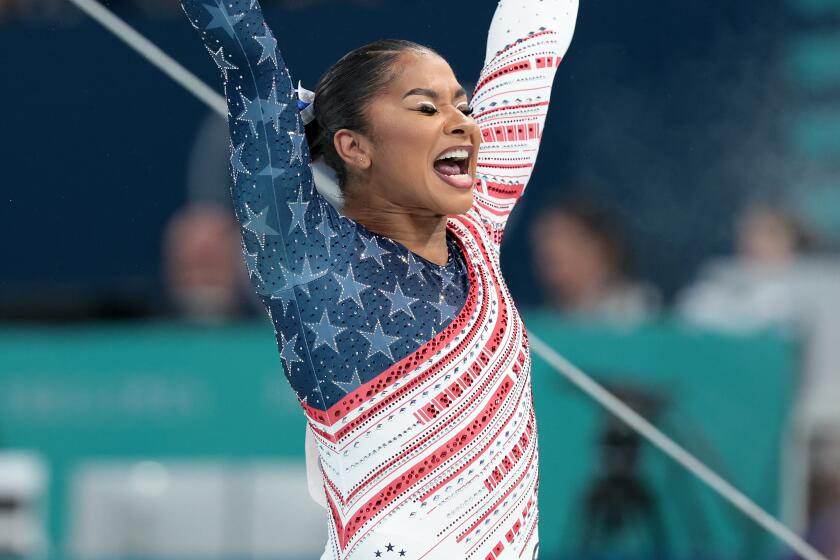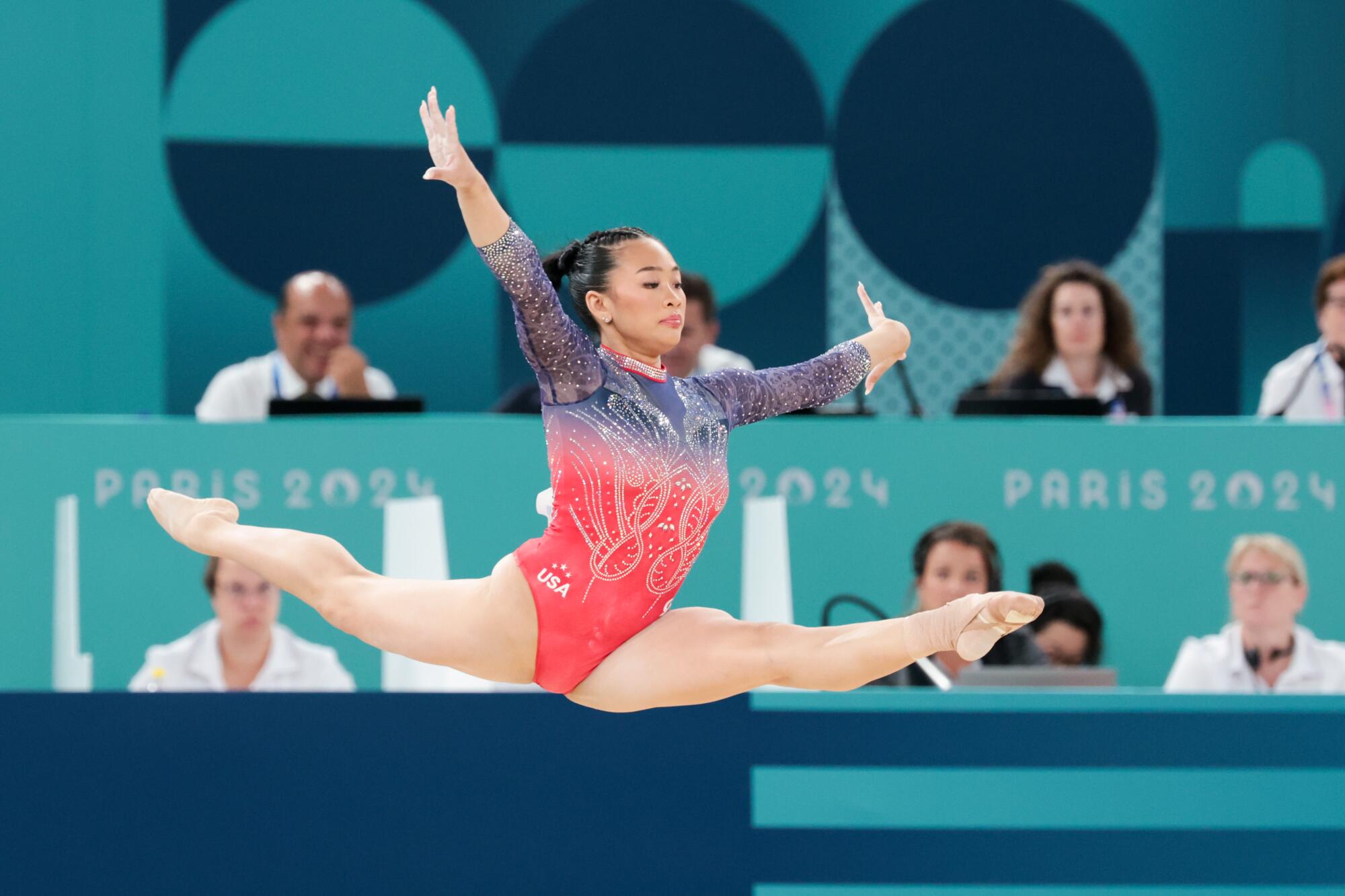
- Share via
PARIS — As little as an hour before Suni Lee stood on the third step of the Olympic all-around podium, Jess Graba couldn’t imagine this moment.
In December, the coach’s star pupil was “rotting” in her bedroom, mourning the gymnast she used to be and uncertain about the woman she would become after two kidney diseases morphed her body beyond recognition. On the first day of August, Lee was an Olympic all-around medalist again.
“Not many people train for seven months for a medal,” Graba said. “Nobody does. Only her.”
Lee’s miraculous comeback continued Thursday in the women’s all-around final, where she took the bronze medal. Although she qualified in third place, had the third-highest difficulty score in the all-around final field and had just helped the United States win gold in the team competition, Lee spent much of Thursday telling others she wouldn’t medal in the all-around. She walked out of Bercy Arena with her fifth Olympic medal in hand.
“I wanted to just prove to myself that I could do it,” Lee said, “because I didn’t think that I could.”
Joining gold medalist Simone Biles on the podium, the stars became the first U.S. women to win two Olympic all-around medals. Three years ago, Lee was the one on the top step. Biles, struggling with a mental block that prevented her from being able to control her body in the air, cheered from the mostly empty stands in Tokyo.
A lot has changed for both since then.
“It was great to be out there with her,” Lee said Thursday, “and do it the right way this time.”
The longtime teammates kept each other calm during a nervy meet. Biles, the most decorated gymnast in history, was sweating out the 1.199-point margin of victory over Brazilian star Rebeca Andrade, who won her second consecutive Olympic all-around silver medal. Between routines, Biles and Lee talked about the scores that they needed. They gave up when they realized they were never going to win medals in mental math.
Instead Graba, who has been coaching Lee since she was 6 years old, told her plainly: Whoever wins floor, wins the bronze medal.
“So,” he added, “go win floor.”
1
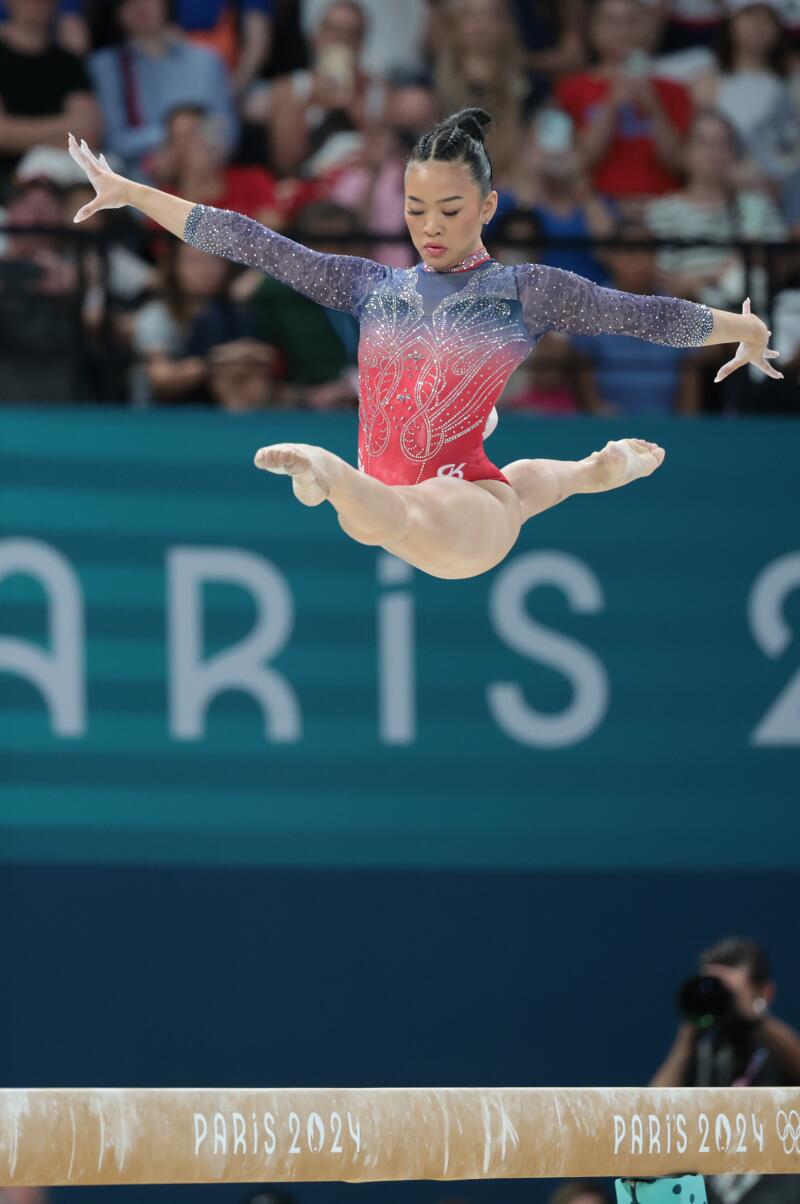
2
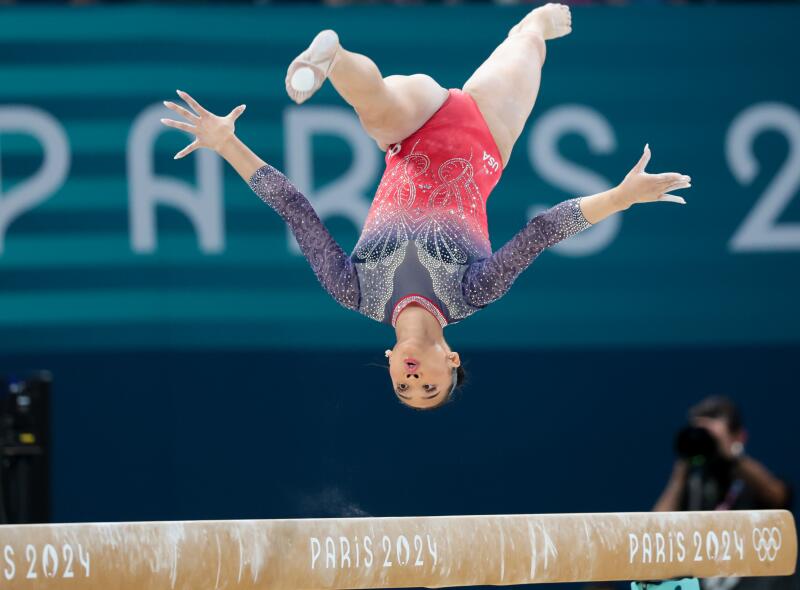
3
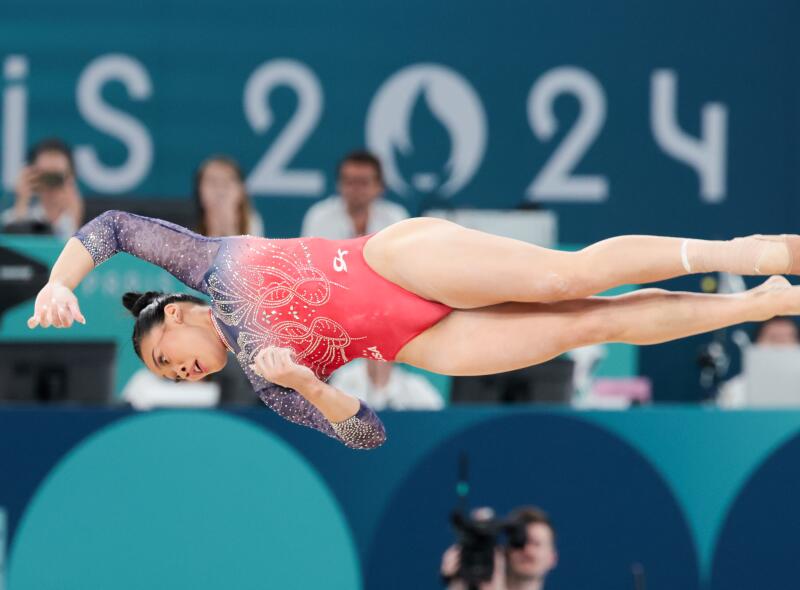
1. Suni Lee competes on the balance beam during the women’s all-around final at the Paris Olympic Games on Thursday. 2. Lee competes on the balance beam. 3. Suni Lee competes in floor exercise in the all-around final at the Paris Games. (Wally Skalij / Los Angeles Times)
Lee nailed her first tumbling pass, a difficult double-flipping layout with a full twist. Her jaw dropped.
The other bronze medal contenders, Italy’s Alice D’Amato and Algeria’s Kaylia Nemour, left the door open. D’Amato stepped out of bounds on her first tumbling pass, a 0.1-point deduction. Nemour landed short on her last pass and took a large step forward.
Lee had the highest floor score of the three to win bronze by 0.123 points.
“She’s just such a fighter,” Graba said. “I always bet on her. I told her that too: I’ll always put my money on you, because you always fight.”
When she woke up one morning last year with her face swollen beyond recognition and her joints unable to move, Lee was panicked. The culprit, doctors found, was a pair of kidney diseases that, had they gone untreated, could have led to kidney failure. She worked for months to find appropriate treatment.
Simone Biles’ redemption tour continues, with the star winning the Paris Olympics women’s gymnastics individual all-around gold medal Thursday.
The results were inconsistent. She teased a video online in January of a never-before-competed full-twisting release skill on bars. Other days she couldn’t even fit her fingers into her grips to hold the bar at all. She and her coaches never knew how her body would react on a given day.
Already having gotten a taste of what life could be after gymnastics when she went on her post-Tokyo publicity tour, she thought about quitting constantly. She could eat all the delicious food her mom cooked, gorge on pizza while taking vacations with friends and never have to miss anything because of practice.
Only a few months ago, she called Graba and said she was done. He wasn’t going to fight her, he responded, but at least come into the gym to talk about it.
“I was gonna let her quit,” Graba said. “If that’s what she needed, and that’s what made her healthy, I would have been fine with it. But I thought she would regret it.”
The path back was slow. Her performance at U.S. championships three months ago was her first all-around competition at an elite meet since Tokyo. Lee would get discouraged when she went to the gym because she remembered the 2021 Olympic champion. She missed her.
“I’m never gonna be the same,” Lee said earlier this year. “I’m not the same Suni, not the same athlete. And [my coaches said], ‘Good. You don’t want to be.’”
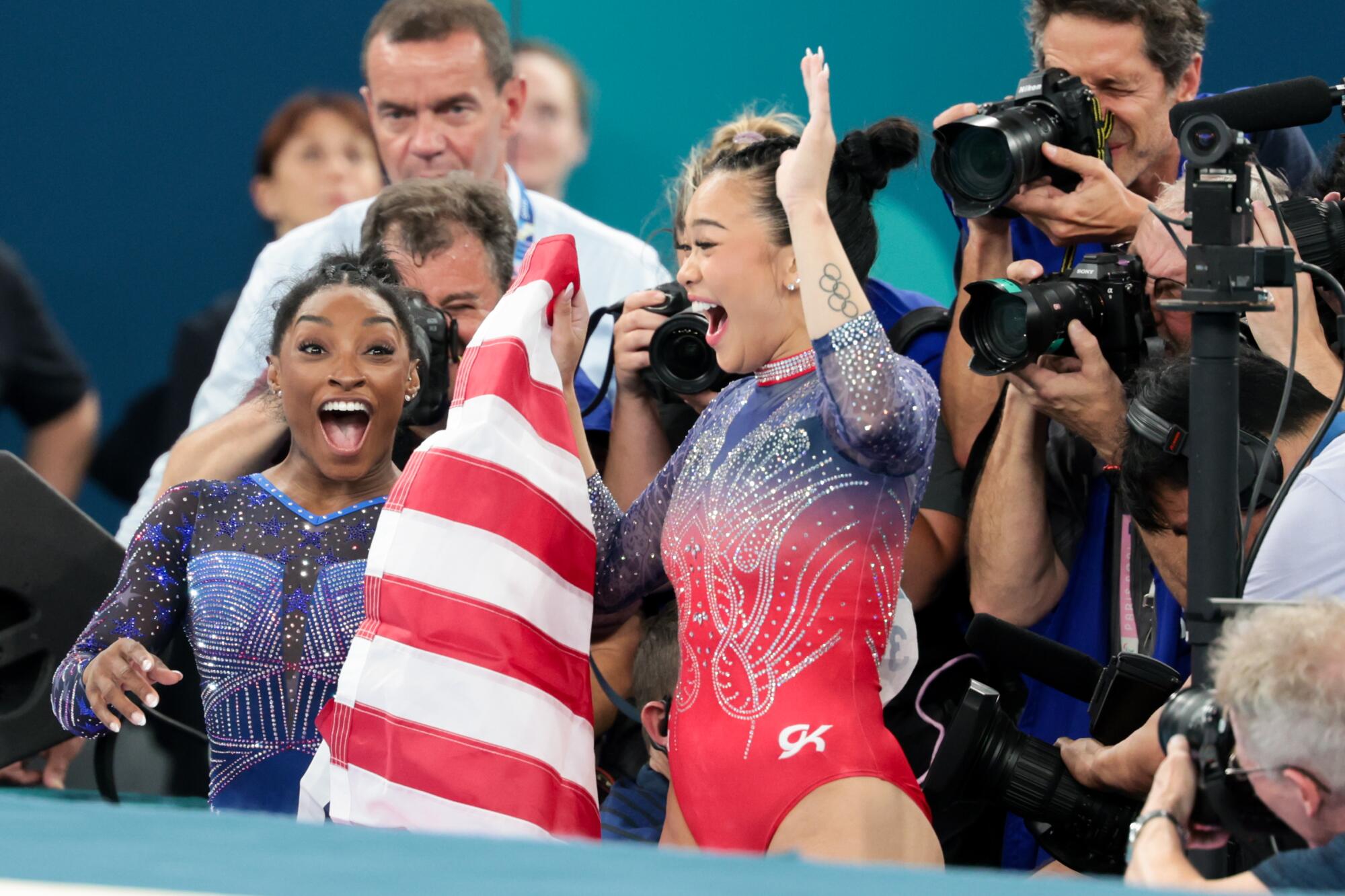
Lee, who said her kidney diseases are in remission, has worked regularly with a therapist during her comeback. The experience has taught her she is “a lot stronger than I think,” Lee said after making the Olympic team.
After the floor routine that made her an Olympic champion in Tokyo, Lee shuffled off the podium with a concerned look on her face. She and Graba were “trying to accomplish stuff” in that Olympics. Lee held her all-around gold medal up with a tight-lipped smile.
In Paris, they’re just happy to be here. Lee beamed during her floor routine and flashed a toothy grin while waving to the crowd as she walked off. She hadn’t even heard her score yet.
“The smile,” Graba said, “is the real reason you do it.”
UCLA star Jordan Chiles put on a show during the Paris Olympics, getting the crowd on its feet and inspiring her teammates during their gold-medal run.
More to Read
Go beyond the scoreboard
Get the latest on L.A.'s teams in the daily Sports Report newsletter.
You may occasionally receive promotional content from the Los Angeles Times.

